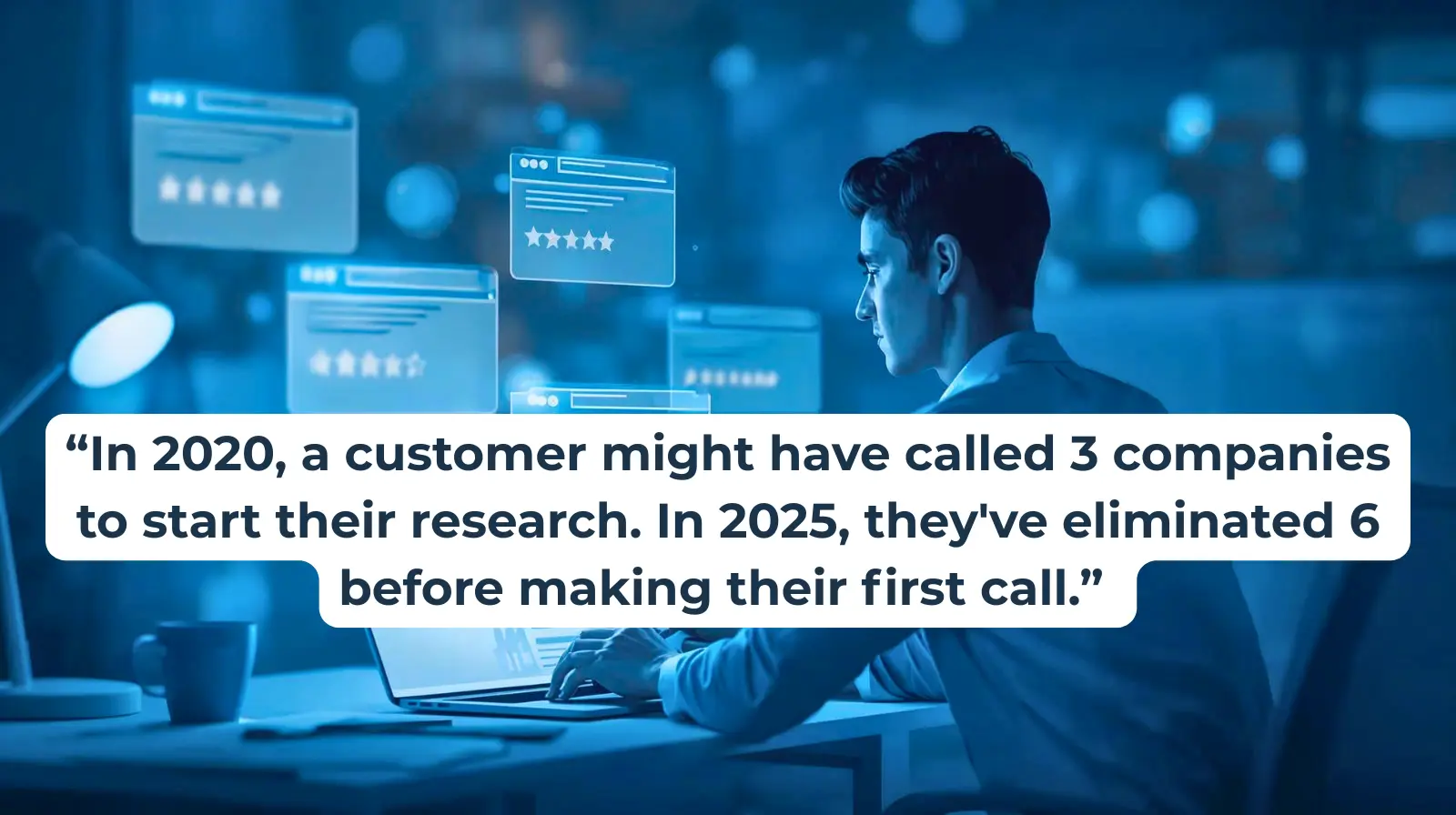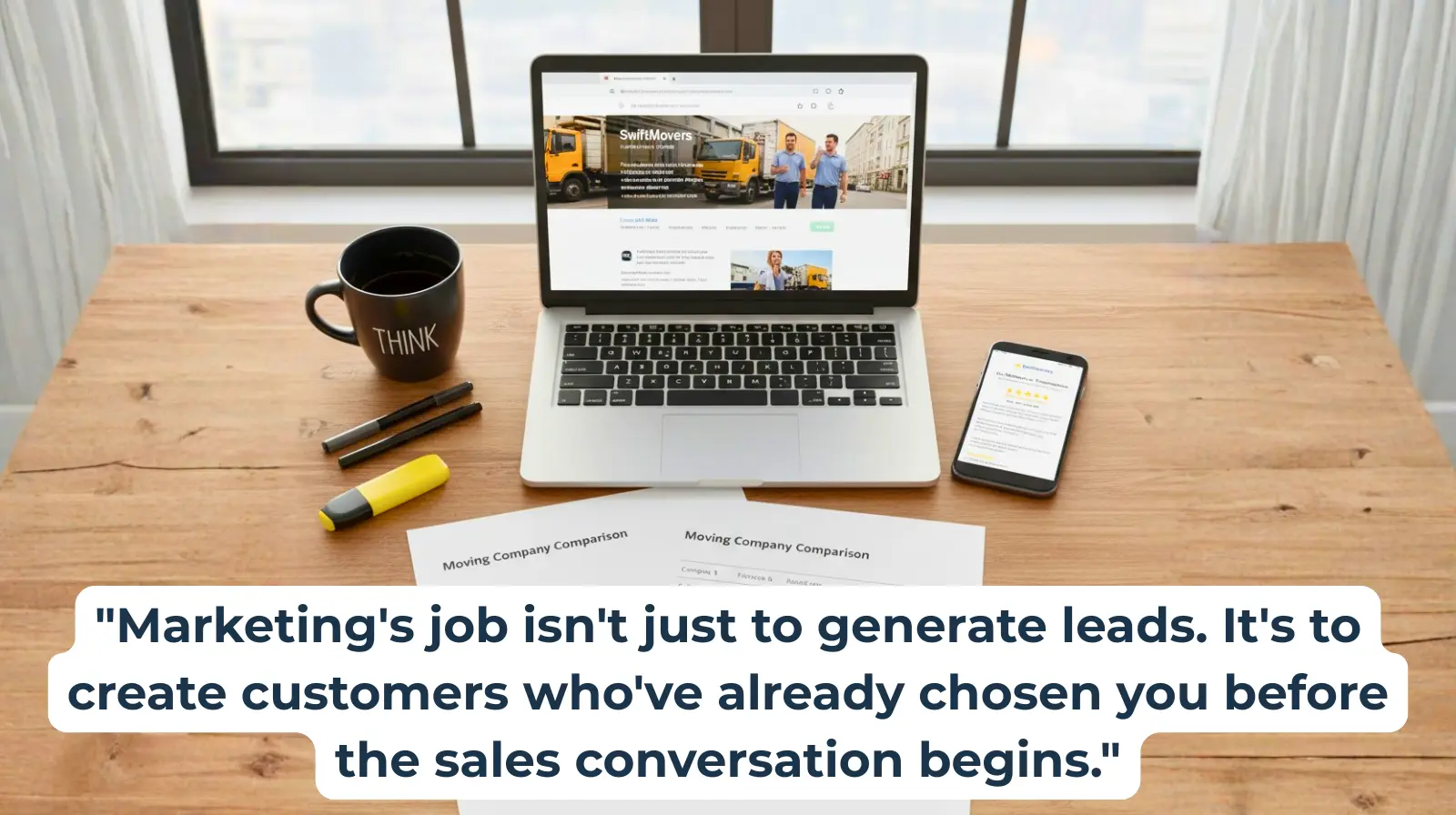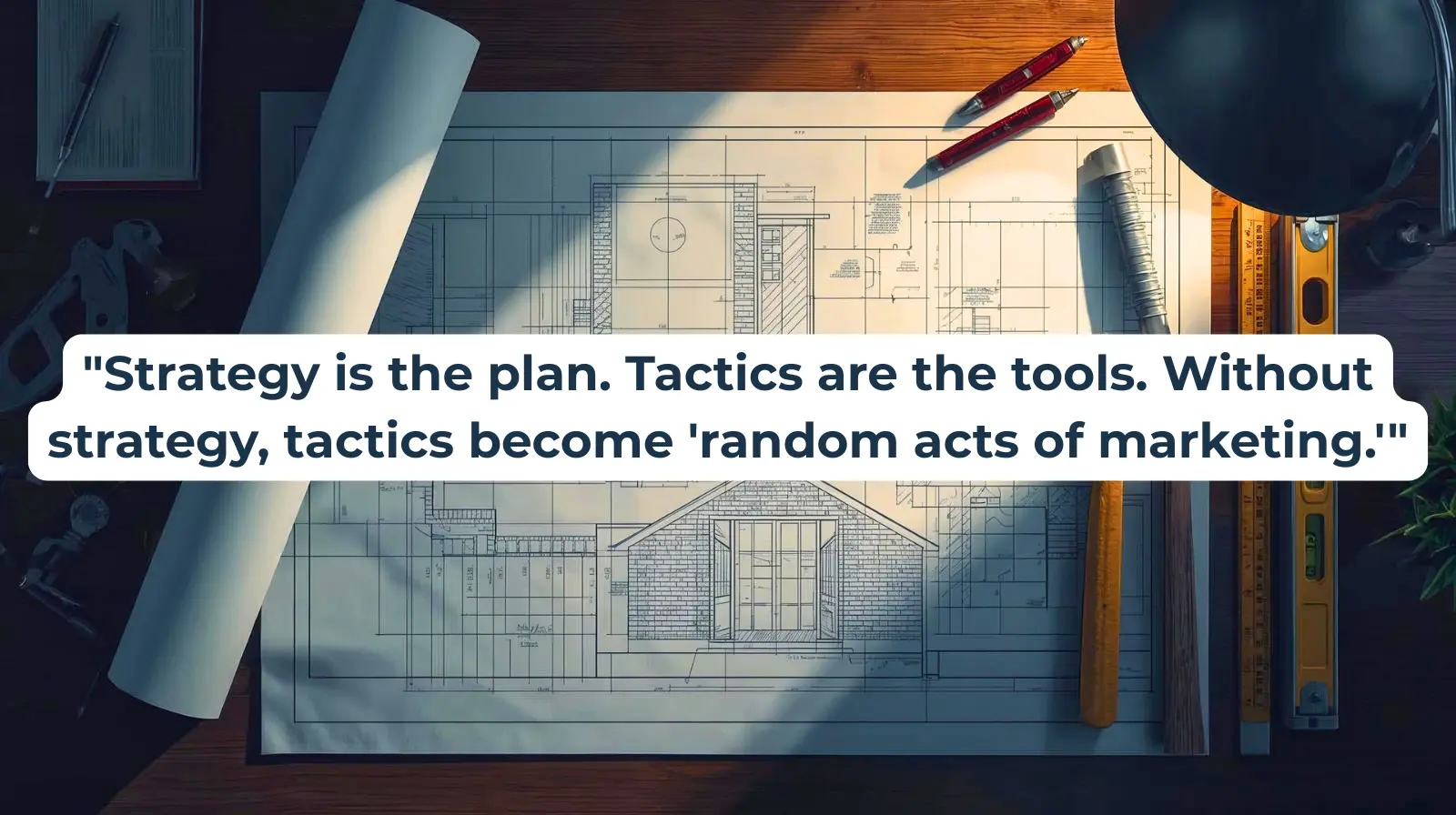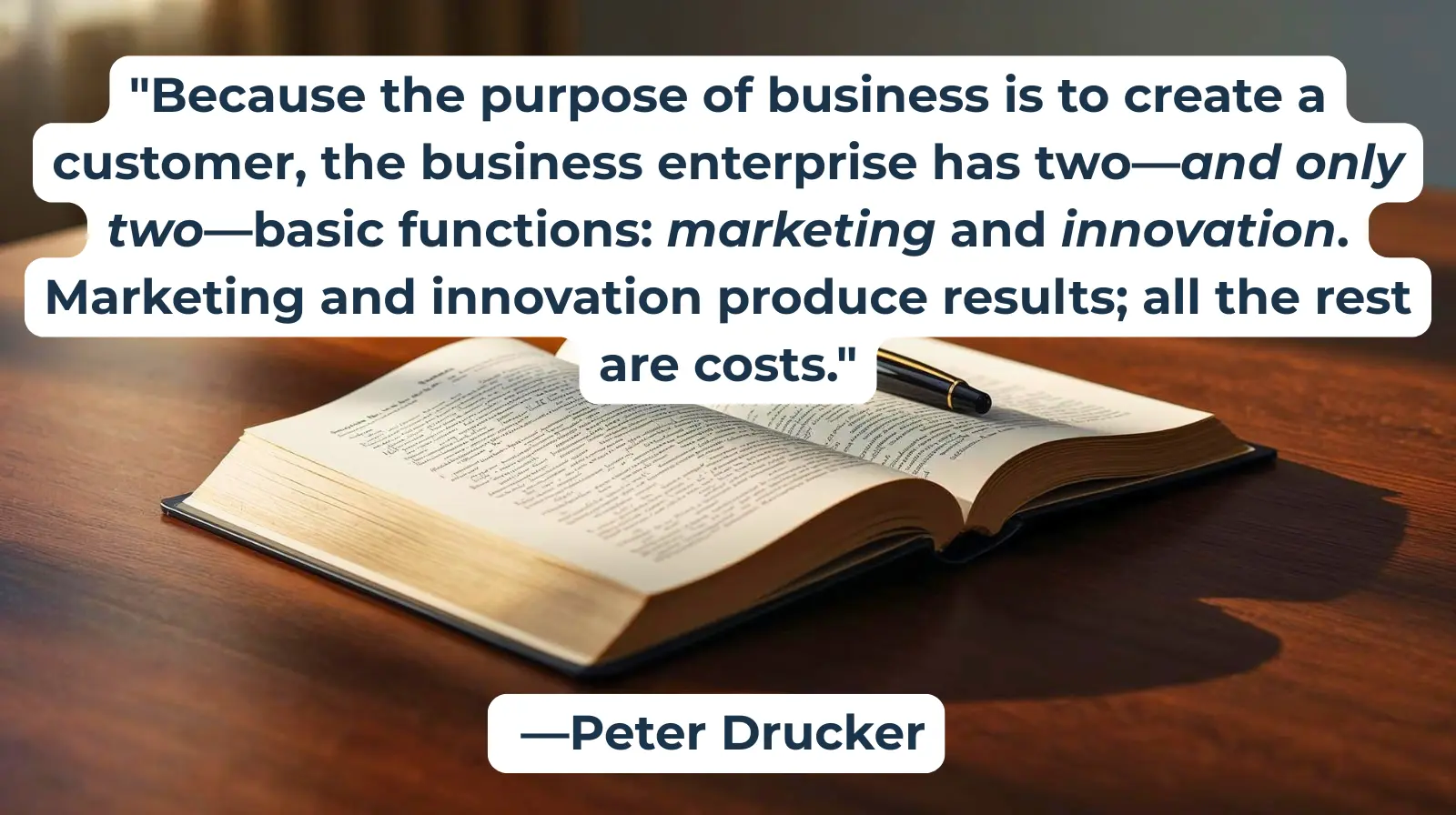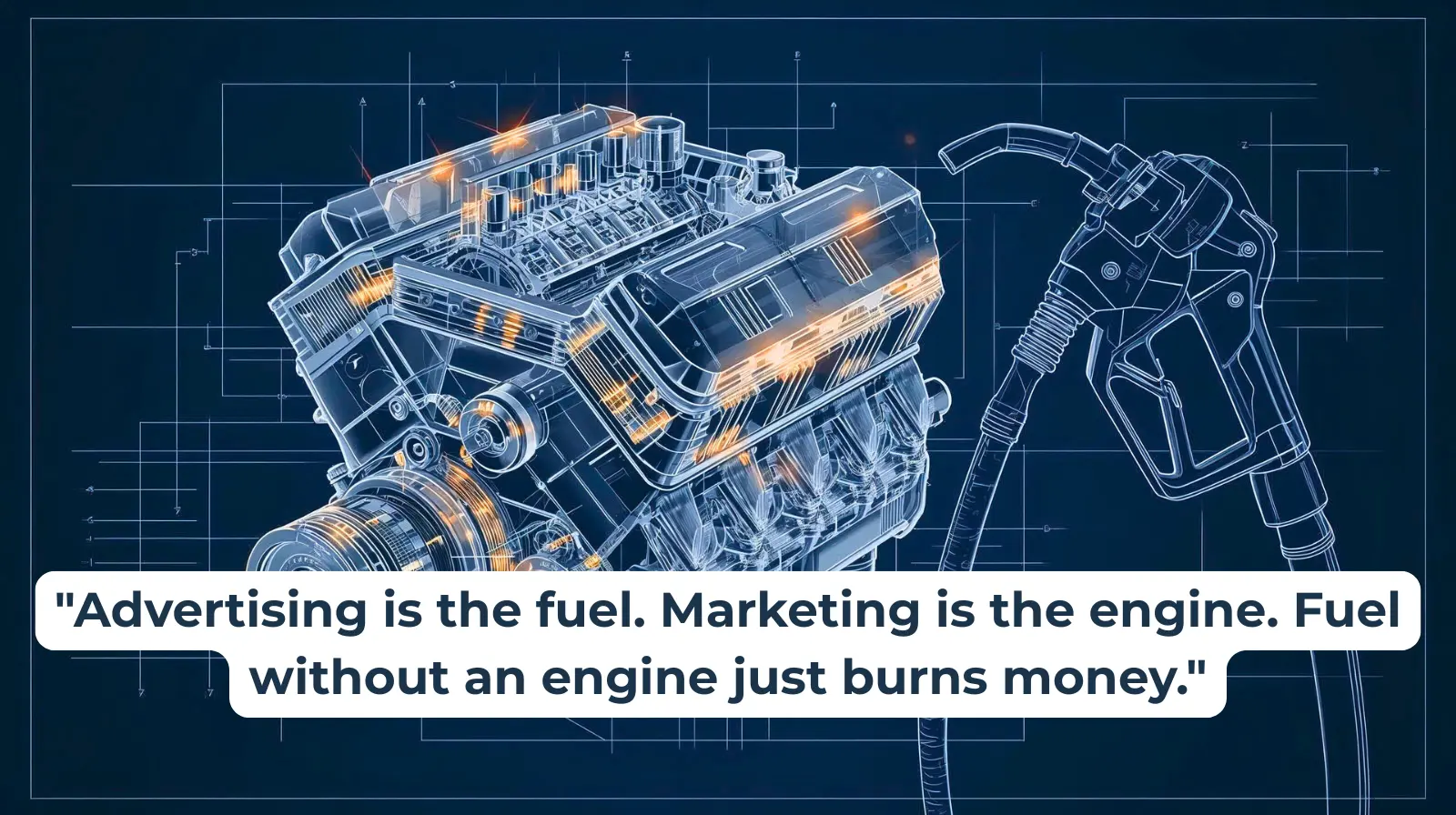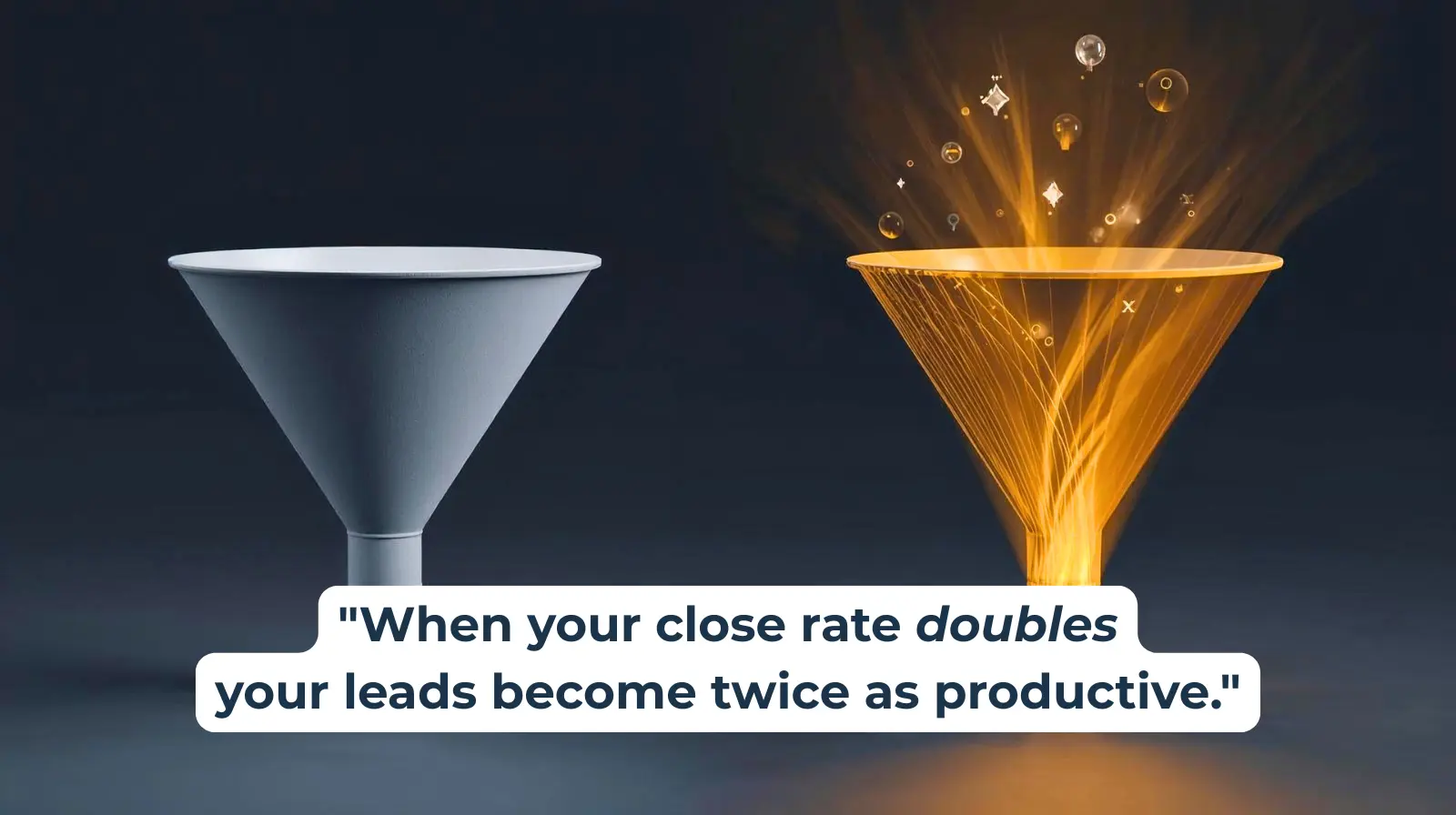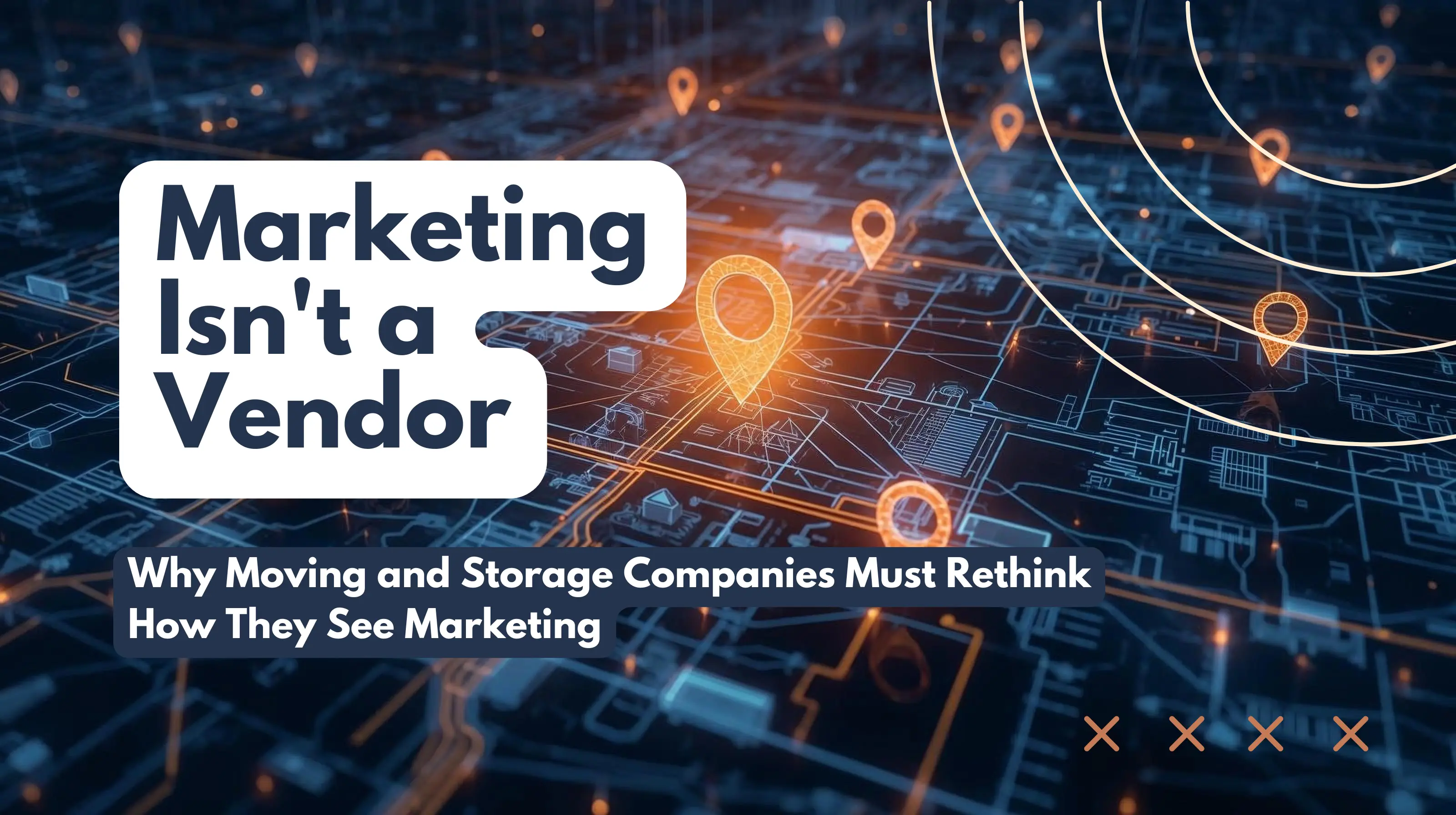
Marketing Isn't a Vendor
Why moving and storage companies must rethink how they build demand long before the sales call.
Hit play for the narrated version of this article—perfect for your next commute, walk, or working session.
If you've bounced between SEO companies, switched PPC agencies, or tried "the latest thing" in digital marketing—and still feel like you're running in place—you've discovered something important: different vendors, same results.
That's not a coincidence. You're treating marketing like a procurement decision when it's actually a strategic discipline.
Many moving & storage company leaders tend to lean towards thinking that marketing means answering one question: "Which vendors should I hire this year—SEO, PPC, or social media?" That mindset treats marketing like a cost center or a quick fix rather than what it actually is: the system that creates customers. The result? Fragmented efforts, wasted dollars, and no compounding value.
Peter Drucker—often called the father of modern management and one of the most influential business thinkers of the 20th century—famously observed that marketing isn't just another business function. It's one of only two activities that actually produce results. As he put it: "Because the purpose of business is to create a customer, the business enterprise has two—and only two—basic functions: marketing and innovation. Marketing and innovation produce results; all the rest are costs."
Everything else, he argued, is cost! But to understand why that matters, we first need to understand what marketing actually is.
Marketing Is Not Advertising—It's How You Create Customers
Here's the distinction most leaders miss: marketing is the discipline of understanding your customer so deeply that your service sells itself. Advertising is just one tool within that discipline—a megaphone. But marketing is the entire plan that decides what you'll say, who you'll say it to, and why it matters.
Philip Kotler, widely regarded as the father of modern marketing, spent his career establishing marketing as a rigorous discipline built on research, strategy, and customer understanding—not just promotional tactics. The marketing discipline encompasses everything from identifying your ideal customer segments to developing services that meet their needs, from pricing strategy to the experience customers have before, during, and after the move.
Think of it this way: advertising is the fuel; marketing is the engine. Fuel without an engine just burns money.
When you hire an SEO vendor without a clear understanding of who you're trying to reach and why they should choose you, you're buying lumber before drawing the blueprints. You might end up with a pile of materials, but you won't have a house.
Why This Matters More Than Ever
The moving and storage industry has historically been very sales-driven—in-home estimates, personal walkthroughs, one-on-one conversations. Those tactics still work, and they should remain central to how service businesses operate. But here's what's changed: customers don't want to start those conversations until they're already sure they want to move forward.
Ask yourself: When was the last time a customer called and said, "I've already decided—I want to book with you"? Not "give me a quote." Not "I'm comparing three companies." But "I'm ready to move forward."
If that doesn't happen regularly, your marketing isn't working—no matter how much you're spending. Because marketing's job isn't just to generate leads. It's to create customers who've already chosen you before the sales conversation begins.
In 2020, a potential customer might have called three moving companies to start their research. In 2025, they've already eliminated six companies before making their first call. They've read reviews, compared websites, watched videos, and maybe even asked an AI chatbot for recommendations—all in an ad-free environment where your paid advertising doesn't reach them.
The question for your business is simple: Were you one of the six they eliminated, or one of the three they're considering?
This shift is accelerating. Ad spend is up across industries, cost per click is rising, but the effectiveness of traditional advertising is declining. People have learned to ignore most promotions. They're researching privately, using AI and social content to find answers without sitting through sales pitches. Trust is now built before they ever fill out a form or pick up the phone.
Without strategic marketing—the kind that builds brand recognition, establishes credibility, and creates differentiation before the sales conversation begins—your company becomes invisible to the modern buyer.
What Marketing Actually Does for a Service Business
When leaders hear "marketing," many think of lead generation. But strategic marketing creates value in ways that compound over time and transform the entire business:
It builds brand equity. Brand equity means people remember your name when the move becomes real. It means when they Google "movers near me," they already recognize your company from the truck they saw, the content they read, or the friend who recommended you. Strong brand equity allows you to charge premium prices, close deals faster, and weather market downturns more effectively because customers choose you based on trust, not just price.
It improves close rates. When a customer already trusts your brand before the estimate, they're not shopping—they're confirming. At Bailey's Moving and Storage, we've seen our booked lead conversion rate double over the last five years. That didn't happen just because we got better at sales; we haven't made large sweeping sales changes. It happened because marketing did its job before the salesperson ever showed up.
It reduces price pressure. Customers pay for confidence, not the lowest bid. When your marketing has established you as the knowledgeable, reliable choice, fewer conversations devolve into price negotiations. You're explaining your value, not defending your price.
It drives repeat and referral business. The cheapest lead you'll ever acquire is the one you already earned. Strategic marketing builds systems for staying connected with past customers, encouraging reviews, and generating referrals. These leads cost a fraction of cold advertising and close at much higher rates.
Strategy Before Spend
Here's where most moving companies get it wrong: they jump straight to tactics without strategy.
Tactics are the tools—SEO, PPC, direct mail, video ads, social media. Strategy is the plan that tells you who you serve, how you're different, and what you stand for. Without strategy, tactics become what marketing consultants call "random acts of marketing"—disconnected activities that might generate some results but never build lasting value.
Real marketing begins with questions that most leaders have never systematically answered:
- Who is our ideal customer? (HINT: it's not "everyone who needs to move.")
- What specific problem are we solving for them that competitors don't address as well?
- Why should they choose us over the ten other options they're considering?
- What experience do we want them to have before, during, and after the move?
- How do we want to be known in our market?
At Bailey's, one of our most important strategic decisions was defining our customer segments clearly, especially regarding residential household goods moves. We didn't change our services. We changed how we talked about them, who we targeted, and what we emphasized in our messaging. The result was a significant increase in qualified leads and a decrease in price objections, because we were speaking directly to the specific needs of each segment.
Strategy doesn't have to be complicated, but it does have to exist. And it has to come before you spend another dollar on vendors.
The Real ROI of Doing Marketing Right
For leaders skeptical about investing in marketing—especially in an uncertain economy—the question is always ROI. But marketing ROI shows up in three distinct ways that most companies don't track:
Financial ROI
Research consistently shows that companies investing 7-10% of revenue in strategic marketing outperform their peers on growth and customer retention. But the real financial impact shows up in metrics like cost per acquisition, close rate, and pricing power.
Strong brands can charge 10-20% higher prices than competitors and close deals faster because customers trust them more. Strategic marketing reduces your cost per booked move by improving lead quality and conversion rates at every stage of the funnel.
At Bailey's, one of our most significant marketing achievements has been reducing our dependence on lead generation from our van line partner. While we're grateful for our partnership with Allied Van Lines and value it deeply, a substantial portion of our total leads now come from our own marketing and advertising efforts. That's not just diversification—it's proof that we've built brand equity and recognition for Bailey's Moving and Storage itself. We're not wholly dependent on any single relationship for our success, which gives us resilience and negotiating power.
Operational ROI
Good marketing makes the entire business more efficient. Sales teams waste less time chasing unqualified leads. Consistent brand clarity shortens sales cycles and increases estimator productivity. Customer service improves because marketing has already set proper expectations.
When your close rate doubles—as ours did—your leads become twice as productive. That's marketing doing its job by pre-qualifying and pre-selling customers before the conversation begins.
Strategic ROI
Marketing insight informs pricing decisions, service design, and capacity planning. Brand strength dramatically increases business valuation—your name itself becomes a transferable asset. And perhaps most importantly, strategic marketing creates predictability. No business will be without external influencing factors, but you're not as much at the mercy of housing market cycles or Google algorithm changes (or the next AI change) because you've built multiple channels and a loyal customer base.
The companies that understand this don't think of marketing as an expense line item. They think of it as the system that keeps their trucks full and their brand irreplaceable.
What Leaders Should Do Next
You don't need to become a marketing expert overnight. But you do need to shift how you think about marketing—from vendor management to business discipline. Here's where to start:
Learn before you buy. Before hiring another vendor, invest time in understanding what marketing actually is. Read, take courses, talk to people who've built successful brands. The decisions you make about marketing investment will be exponentially better if you understand the fundamentals.
Develop a strategy first. Answer the strategic questions: who you serve, what makes you different, what experience you create. Document this clearly enough that everyone in your organization understands it. This becomes your filter for every marketing decision.
Align your entire team. Marketing isn't just ads—it's how every employee communicates value. Your dispatch team, your drivers, your estimators—they're all part of your marketing system. What they say and how they act either reinforces or undermines everything you're trying to build.
Invest consistently. Growth compounds, but inconsistency kills momentum. The companies that succeed with marketing commit to sustained investment over years, not months. They understand that building brand equity and market position takes time.
Measure what matters. Look beyond lead volume. Track brand awareness, website traffic growth, close rates, customer satisfaction, repeat business rates, and customer lifetime value. These metrics tell you whether your marketing is building an asset or just generating activity.
Marketing isn't another cost center. It's the discipline that creates customers. And in a world where customers research privately and make decisions before they ever talk to you, marketing is what determines whether you're even in the conversation.
The Companies That Win the Next Decade
Peter Drucker observed that marketing and innovation are what produce results in business; everything else is cost. That's not marketing hyperbole—it's fundamental business truth.
In the moving and storage industry, everyone can buy the same trucks, hire similar crews, and for the most part, use the same software. The operational playbook is well-established and widely available. The only real differentiator—the only sustainable competitive advantage—is how well you connect with customers.
That's marketing. Not vendors. Not quick fixes. Not choosing between SEO and PPC.
It's the strategic discipline of understanding your customers so deeply that your service becomes their obvious choice. It's building a brand that people trust before they've met you. It's creating systems that turn one-time transactions into long-term relationships.
The moving companies that figure this out won't just survive the next downturn—they'll own the market when it rebounds. They'll be the names customers remember, the brands people trust, and the businesses that command premium prices because they've earned them.
The question isn't whether to invest in marketing. Every business already does, either strategically or by default. The question is whether you'll continue to treat marketing as vendor selection, or whether you'll embrace it as the business discipline it actually is—one of the only two functions that actually creates value.
Your trucks, your warehouses, your software—those are costs. Your ability to create customers? That's what builds a business that lasts.
